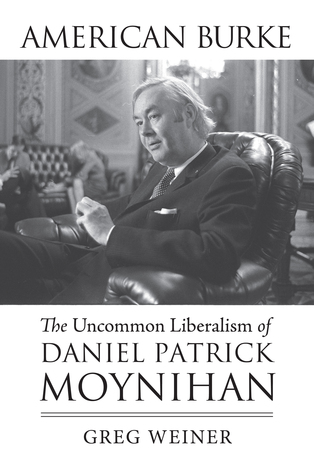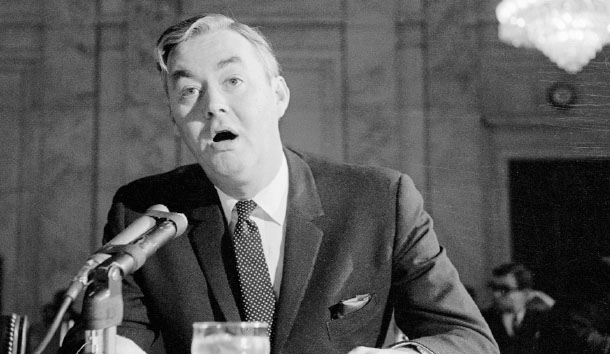
From the December 2015 issue of Chronicles.
Daniel Patrick Moynihan (1927-2003) was the most substantial intellectual to reach high political office in the United States since Woodrow Wilson. Thus his life, writings, policy deliberations, and political efforts, and the effects of these, deserve the most careful and respectful attention. If the apocalyptic era of European history began with the outbreak of World War I in 1914, it is arguable that the American time of troubles reached critical mass in 1965—just 50 years ago—when Moynihan’s report to President Lyndon Johnson on the precipitous decline of the African-American family became public knowledge. Moynihan’s worries about the decline of the American family—white, black, and otherwise—have proved to be prophetic. As the sociologist W. Bradford Wilcox of the University of Virginia put it in 2010, “Non-marital child-bearing among [all] women with high-school degrees more than tripled in the last three decades—from 13 percent in 1982 to 44 percent in 2006-8.”
Greg Weiner, a political scientist, has written an excellent short book on Moynihan, rightly comparing his thought and career with those of Edmund Burke. Weiner’s book joins several other important volumes on Moynihan, including Godfrey Hodgson’s excellent The Gentleman From New York: Daniel Patrick Moynihan, A Biography (2000), and the indispensable recent anthology edited by Steven R. Weisman, Daniel Patrick Moynihan: A Portrait in Letters of An American Visionary (2010). Moynihan’s service to presidents Kennedy, Johnson, and Nixon and his ambassadorships to the United Nations and India predated his long and distinguished service as U.S. senator from New York from 1977 until 2001, not long before his death in 2003. It is true, though not the highest of compliments that Moynihan deserves, to say that his honor, honesty, intelligence, articulateness, and devotion to the common good make most of our presidents and legislators since World War II look like pathetically small figures indeed: the Kennedys, Nixon, and the Clintons hardly commend the quality of modern American political leadership. Opposing the radical wing of the Democratic Party in 1980, Moynihan charged it with holding that “government should be strong and America should be weak.”
Weiner’s comparison of Moynihan with Burke is particularly apt, since Burke came at the beginning of a sociopolitical tradition on which Moynihan clearly drew and helped to develop and apply—the tradition of Tocqueville, Catholic social thought, and sociology as practiced by Robert Nisbet and Peter L. Berger. This way of approaching politics enjoins respect for family, church, neighborhood, voluntary associations, tradition, federalism, decentralization—even for ethnicity and class. Its great spokesmen dreaded two extremes to which modern history has been prone since the French Revolution: atomistic individualism and statism. Atomistic individualism gives us radical, rootless, anxious or transgressive self-obsession, the Nietzschean consciousness, now so widespread, with its underlying belief, implicit or explicit, that there exists nothing authoritative that is anterior, exterior, or superior to the self. This atheistic, anomic, alienated, “liberated” condition entails what Nisbet called “the twilight of authority,” and the “emancipated” individual drawn to the competing claims of the omnicompetent state. European history since 1914 is that of the oscillations between these extremes, while American history since about 1965 displays a similar pattern, with no promising end in sight. Like Reinhold Niebuhr, Moynihan wrote, Nisbet “holds that the civilization that begins by creating this autonomous individual ends by destroying him” through statist conformity or collectivism. “A society suffused with the alienation of many of its members is a society that courts—if not totalitarianism, at least statism,” he continued. “The state thrives, prospers and grows in an atmosphere of alienation, for it is the only alternative to the purposeful, private, communal activity that decays in the presence of alienation.”
Weiner is up against one rhetorical and logical problem that bedevils his book: “the uncommon liberalism” of Patrick Moynihan. For most leftward-moving Democrats during Moynihan’s adult life he was an uncomfortable figure, an undependable “liberal,” a gadfly, and on crucial occasions a more powerful opponent of liberal Democrats than Republican presidents and legislators. Weiner spends much time fending off the label of neoconservative, often applied to Moynihan, emphasizing his life-long loyalty to what he conceived to be Franklin Roosevelt’s New Deal legacy, especially with its concern for the poor and unemployed. But Moynihan’s actions and words tell a different story: He fought against the gradual disappearance from the mainstream of the Democratic Party of traditional, socially conservative, nonsegregationist loyalties and views—the slow eclipse of figures such as anticommunist, pro-labor Washington Sen. Henry M. Jackson and antiabortion, Catholic Pennsylvania Gov. Robert Casey.
In fact, Moynihan’s views included a profound, persistent, pervasive hostility to the central state and its usurpation of private, regional, subsidiary, and religious institutions in American life. The “crisis of our time,” Moynihan wrote in 1973, “is not political, it is in essence religious. It is a religious crisis of large numbers of intensely moral, even godly, people who no longer hope for God.” In the spirit of Jacques Maritain, Moynihan criticized “the paternalist state” and its “tendency to politicize (and racialize) more and more aspects of modern life.”
His powerful essay “Government and the Ruin of Private Education” (in Counting Our Blessings: Reflections on the Future of America) is a profound example of prudential, conservative thinking and documentation in the tradition of Burke, Tocqueville, Acton, Chesterton, T.S. Eliot, and Nisbet.
Governments inherently, routinely, automatically favor creatures of governments. They know no other way. Joseph Schumpeter’s gloomy prophecy that liberalism will be destroyed through the steady conquest of the private sector by the public sector bids fair to come true in the United States. In no domain of our national life is this clearer or seemingly more inexorable than in education.
In proposing tuition tax-credits for parents with children in private or parochial schools, Moynihan noted that “church-related schools existed and thrived in the United States before the public schools as we know them [even] came into being,” and he exposed the statist premise “that private schools undermine the principle of state monopoly.” Statist liberal Democrats must have realized that the Democratic senator from New York was not one of them. And though the New York Times had, at the last moment, crucially supported Moynihan against Bella Abzug in the 1976 New York state Democratic senatorial primary, the Times editorially denounced his reasoned, careful defense of educational pluralism.
“Truth alone offends,” goes an old French proverb. As a public servant Moynihan, like his contemporary Malcolm Muggeridge and Jonathan Swift before him, had the uncomfortable, distasteful, lifelong habit of actually telling the truth about things insofar as he could discern it. Responding to President Bill Clinton’s vapid, inflated promises to improve American education in his State of the Union Address in 1996, Moynihan said,
He continues to suggest that in a few short years we can be first in the world in science and math. Something like that would take about three generations. . . . The idea that he could say that with a straight face is extraordinary. We are in a disastrous state with regard to this most important part of American life, and what we get is this attitude of “wishing will make it so.”
In regard to the President’s affair with Monica Lewinsky, Moynihan remarked that both Clinton’s personal behavior and his public policies displayed an “absence of character.” Though not in favor of impeaching Clinton, he gave precious little comfort to Clinton and his congressional loyalists: “We had the right to expect that he could have held off until . . . 2002.”
In fact, Moynihan made some of the noblest protests of his time against what he called “the manifest decline of the American civil order,” not least in his essay on liberal linguistic euphemism and evasion, “Defining Deviancy Down,” in The American Scholar. And he never tired of reiterating unflattering, painfully learned home truths: “The family is the basic social unit of American life; it is the basic socializing unit. By and large, adult conduct is learned in the family.” This was particularly poignant coming from the son of a broken family, a poor inner-city New York kid whose father had absconded when he was young. Though Moynihan was viciously and repeatedly attacked from the left as a racist for his report on the collapsing black family, the African-American sociologist Glenn C. Loury has recently argued that these attacks were not only utterly unfair but ultimately tragic in shutting down analysis and debate on the subject.
Even Moynihan’s attack on government secrecy and the CIA in Secrecy: The American Experience (1998) did not please liberals—New York and Hollywood liberals especially, who for so long carried a torch for Alger Hiss. Moynihan, Weiner writes, cited (among many pieces of evidence) “the hoarding of the Venona intercepts [of Soviet Communist intelligence] that enabled the FBI to identify communist infiltration, including Alger Hiss’s guilt, as early as the Truman administration.” But, as Sam Roberts of the New York Times, before citing Moynihan, notes,
Moynihan pointed out that President Harry Truman was never told that by breaking the Soviet wartime code, Washington had largely substantiated Communist Moscow’s infiltration of the American government.
“The Soviets knew we knew they knew. The only one who didn’t know was the president of the United States. Our politics was injured for thirty years by this.”
We may even say it has been damaged ever since, as generations of young Americans have continued to be taught (largely through Arthur Miller’s The Crucible) that “McCarthyism” was a greater evil and threat to the world than Stalinist communism, Whittaker Chambers was a neurotic scoundrel, and Alger Hiss a liberal martyr. The myth lives on, despite numerous correctives, including In Denial: Historians, Communism, and Espionage, by John Earl Haynes and Harvey Klehr, whom Moynihan invited to testify before his Senate committee in the late 1990’s.
More generally, Moynihan was taken with the accuracy and relevance of his friend Lionel Trilling’s analysis of “the adversary culture” that radical intellectuals, professors, and artists had so assiduously promoted, first in France in the 18th century, then in late 19th-century Germany, and finally in the United States, beginning in the 1960’s. This alienated, atheistic, postmoral cultural insurgency was rooted in the great metaphysical and theological denials of Darwin, Marx, Nietzsche, and Freud. It is a particularly moving aspect of Moynihan’s career that he opposed this culture while recognizing that it was gradually being established as a new orthodoxy, one that most conservatives barely understood and often unwittingly served in their worship of the market and that many liberals did understand but could not bring themselves to oppose on account of its passionate, supposedly authentic, and perversely glamorous moral extremism. Today, of course, it is the culture in which we must all live our lives.

[American Burke: The Uncommon Liberalism of Daniel Patrick Moynihan, by Greg Weiner (University Press of Kansas) 189 pp., $27.95]
Leave a Reply